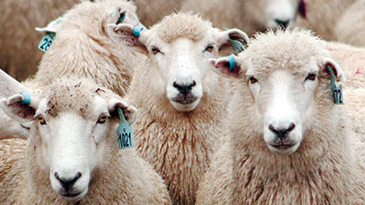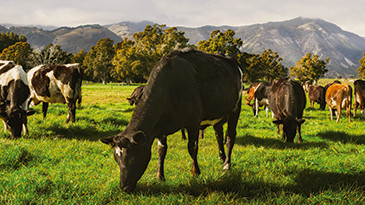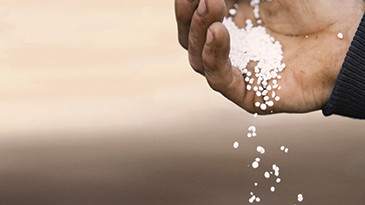Why fertiliser matters
Fertiliser is just another word for nutrients. Plants need nutrients just like humans do. Fertiliser contains nutrients like nitrogen, phosphorus, potassium and sulphur.
Nutrients need to be applied responsibly. Too much of the wrong nutrient in the wrong place at the wrong time will cause environmental problems. Fertiliser is one of the biggest investments for a farm operation, so waste must be minimised.
As a farmer-owned co-operative, this is where Ravensdown comes in.
Nitrogen in fertiliser
-
Nitrogen is part of all the food proteins animals and humans consume and is needed by plants to grow.
-
Nitrogen makes up 78% of the air we breathe.
-
Nitrogen is used by farmers and fruit and veggie growers to create food that is affordable, nutritious and earns the country billions of dollars.
-
Nitrogen is captured from the air by plants such as clover, but clover only grows at certain times of the year.
-
We use technology to capture nitrogen so we can supply it to plants when the clover-like plants do not provide enough.
-
Whether nitrogen has come from fertiliser or from the clover-like plants, it is much more concentrated in animal urine and this urine increases the risk of nitrogen being leached into waterways as nitrate, particularly in winter.
|

Reducing risk of nitrate leaching
Farmers and growers use nitrogen to produce food. Use too little and their plants don’t grow enough and animals go hungry. Use too much at the wrong time and waterways are at risk and the nitrogen (which costs money) is wasted.
Here’s how farmers can improve their nitrogen use and reduce waste:
-
Accurate supply of just the right amount of nitrogen needed by plants at the right time and in the right place to help growth but minimise runoff to waterways.
-
Have fewer cows with better genetics.
-
Use breeding to select plants that more efficiently produce food.
-
Use fertiliser products with coatings that reduce the risk of nitrogen being lost to the air or water.
-
Seek advice from certified advisors or farm environmental consultants.
|

Who decides how much nitrogen is too much?
- Many farmers and growers are already doing the right thing by the environment.
- Some regions have imposed limits on the amount of nitrogen that can be lost to the environment. The trade-offs between the local community, the environment and economy need to be considered carefully by the people most affected.
- Removing nitrogen completely from fertiliser would reduce plant growth. This would raise food prices dramatically and reduce the quality, availability and variety of foods we enjoy. Less production would drastically reduce New Zealand export earnings and the tax in Government’s coffers.
- Removing nitrogen fertiliser would not stop excess nitrogen leaching into waterways from where it is being generated from crops such as clover, peas and gorse, and from activity in towns and cities.
|

Ravensdown is here to optimise not maximise
- Ravensdown is a co-operative that believes in smarter farming for a better New Zealand.
- Our teams of certified advisors and environmental consultants advise farmers on using just the right amount of nitrogen needed by plants at the right time and in the right place. We have the largest team of farm environmental consultants in New Zealand.
- At times, this will mean less fertiliser is applied. Ravensdown is fine with that because it’s a co-operative and doesn’t exist to maximise profit or sales.
- Ravensdown is a member of the Sustainable Business Council and Climate Leaders Coalition. It measures its emissions and is committed to reducing its own environmental impact as well as that of its farmer shareholders.
- The co-operative invests millions of dollars in science, research and technology that helps farmers and growers manage their nutrients in better ways.
|











